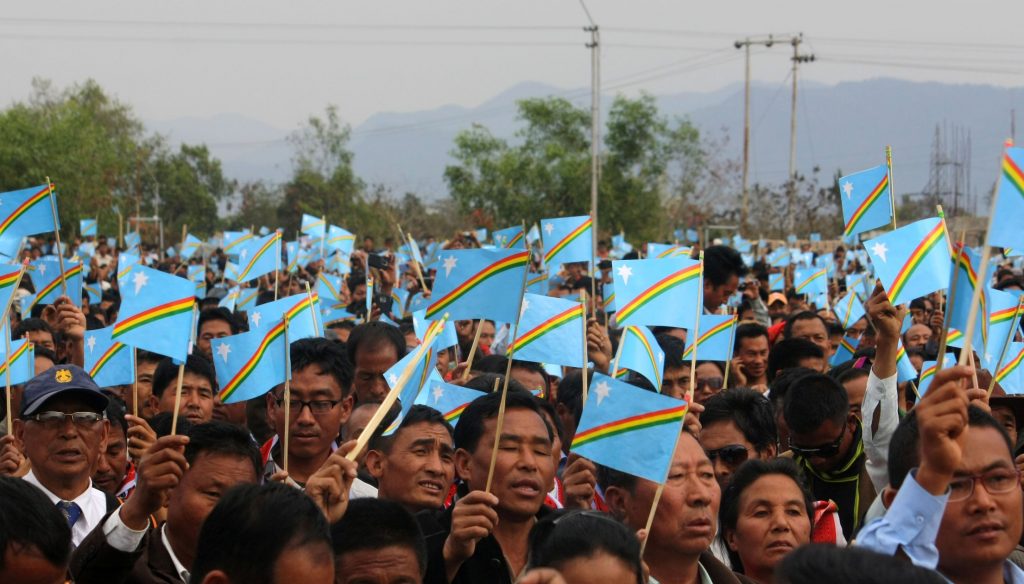
Masses with the Naga flag during one of the public gathering organised by the Forum for Naga Reconciliation a few years ago (File photo)
Even after three years of the signing of the historic framework agreement with the NSCN (IM) and separate talks with the other Naga National Political Groups (NNPGs) , the Narendra Modi government has not been able to conclude negotiations due to a tough position taken by the Nagas on some of the ‘symbolic’ issues, claims a news report filed from New Delhi.
The Indian Express reports that the talks have not seen any progress for almost a year as the Naga groups have refused to change their views on ‘Church’ and ‘separate flag’.
According to the report, the current logjam is largely due to the Church which is at the forefront in articulating the political position of the Nagas. But is the Church really to be blamed for the current impasse? Read below the Indian Express report
Clock ticking, Naga talks stuck for long over issue of symbols
It is politically not viable for the Centre to accept demands such as a separate Naga flag, even though, sources said, it has agreed to guarantee protection of the Naga identity.
Written by Sushant Singh |Source: The Indian Express
As the tenure of the NDA government at the Centre nears completion, there is no progress on negotiations for a peace accord with Naga armed groups, with talks stuck for almost a year due to an intransigent position taken by the Naga side on ‘symbolic’ issues, such as a separate flag.
As reported by The Indian Express on April 26, 2018, ‘substantive’ issues had been resolved between the two sides and a draft agreement was ‘almost ready’ by then. But a change in Naga position has led to apprehensions that any gains made since 2014 will be lost with a change in political dispensation at the Centre.
Contacted by The Indian Express, the Centre’s interlocutor and Deputy National Security Advisor, R N Ravi, said: “I would not like to comment on it as we are engaged with the peace process.”
Ravi has been closely associated with negotiations with Naga groups for decades, first in various capacities as an Intelligence Bureau officer and later as the Centre’s interlocutor in July 2014. He signed the framework agreement with the NSCN-IM in August 2015.
Sources said the current logjam is largely due to the Church, which has taken a lead role in articulating the Naga political position in the past year. The Church has argued that symbols are integral to the identity of the Nagas, and that Naga identity would not be safe without them.
It is politically unviable for the Centre to accept demands such as a separate Naga flag, even though, sources said, it has agreed to guarantee protection of the Naga identity. But if these changes can be brought later through a democratic political process, the Centre would have no objection, sources explained.
At a Church-organised meeting held in Dimapur on September 8 last year by the Forum for Naga Reconciliation, Naga civil society groups and political groups had issued a statement called the ‘Declaration of the Naga Collective Spirit’. It said that “the historical fact that the Naga struggle started before India’s independence strengthens our moral authority” and argued that “the Naga people did not violate any agreement for union made with any nation in our history. This establishes the legitimacy and integrity of Naga rights”.
In what is seen as a repudiation of the argument that Nagas have to be realistic about being a part of India, the declaration noted: “We draw inspiration from Confucius who reminds us that, ‘When it is obvious that goals cannot be achieved, don’t adjust the goals, but adjust the steps’.”
While ruling out any external influence on the Church or any coercion of Naga groups by the religious body, sources said its institutional influence in an “overly religious” society is “coming in the way of a realistic settlement”.
Naga National Political Groups (NNPGs), comprising representatives of six influential Naga rebel groups and the National Socialist Council of Nagaland (Isak-Muivah) or NSCN-IM, had met interlocutors of the Central government last month, and another meeting is scheduled in Delhi this month. But neither side is hopeful of a breakthrough, in light of the political narrative being articulated in Nagaland.
In April 2018, when the two sides appeared to have come to an agreement over substantive issues, Ravi had told this newspaper, “Yes, we are pretty close to finalising the (Naga Peace) accord.” The NSCN-IM leadership had also publicly stated that they were close to signing an accord.
The Centre had agreed to find a solution on the basis of mutually agreed sovereignty rights, which would take the unique history of Nagas into account. Among the substantive issues agreed upon by the two sides was creation of a cultural council for all the Nagas, removal of AFSPA, enhancing political representation of Nagas in Parliament, creation of a bicameral state legislature, autonomous council for Naga-majority areas in Manipur and Arunachal Pradesh and major economic packages for the state of Nagaland. Some of these changes would have been effected through amendments to the Constitution.







 What Does Your Face Say About Your Health?
What Does Your Face Say About Your Health? Meet R.N. Ravi, who is mediating peace with the Nagas
Meet R.N. Ravi, who is mediating peace with the Nagas An orbiting message of peace
An orbiting message of peace The Top Viral YouTube Videos of 2017
The Top Viral YouTube Videos of 2017










Leave a Reply
Your email address will not be published. Required fields are marked (required)